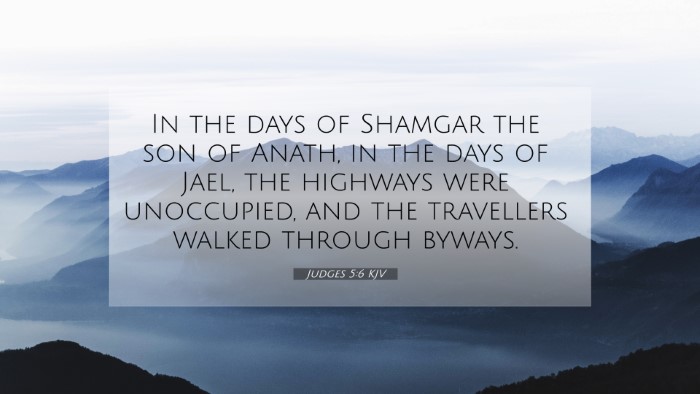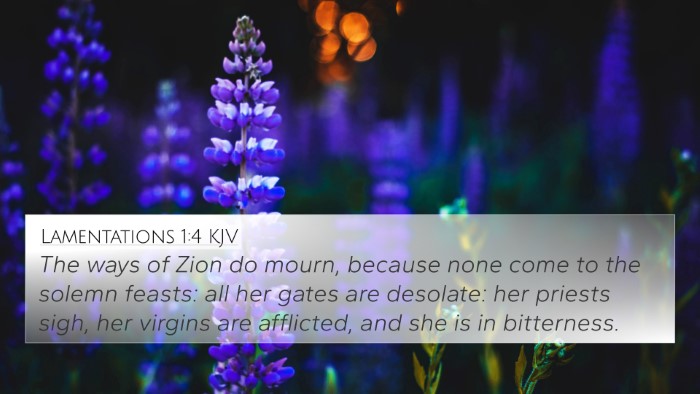Understanding Judges 5:6
Judges 5:6 states:
"In the days of Shamgar, son of Anath, in the days of Jael, the highways were abandoned, and travelers kept to the byways."
Summary of the Verse
This verse highlights a period of turmoil and disruption in Israel, underlining the socio-political climate during the judgeship of Shamgar and the actions of Jael. The abandonment of highways symbolizes a time of fear and danger, as people avoided the main routes due to threats from hostile forces.
Insights from Public Domain Commentaries
-
Matthew Henry:
Henry emphasizes the disarray in Israel during this time, implying that the highways were left forsaken due to the violence and oppression faced by the Israelites. It illustrates a spiritual and physical decline, where the people were compelled to tread less safe paths, literally and figuratively avoiding the straightforward route of righteousness.
-
Albert Barnes:
Barnes notes that the mention of Shamgar and Jael serves as prominent reminders of God's deliverance amid adversity. He interprets the highway's abandonment as a sign of political instability and warns against complacency during peaceful times, urging believers to stay vigilant and faithful, reminiscent of earlier apostacies in Israel.
-
Adam Clarke:
Clarke points out that this verse reflects not only a physical condition but also a moral and spiritual crisis. He contextualizes the mention of Shamgar and Jael as harbingers of hope amidst despair, illustrating God’s providence in raising unlikely heroes, who acted decisively in times of need.
Thematic Connections
This verse connects to broader Biblical themes of crisis, deliverance, and the sovereignty of God through appointed leaders. The abandonment of the highways signifies the spiritual neglect of Israel, a theme prevalent throughout the Books of Judges and Kings.
Cross-References
The following Bible cross-references provide further insights into the implications of fear, divine deliverance, and societal stability in the context of Judges 5:6:
- Judges 3:31 - Reference to Shamgar and his victory over the Philistines.
- Judges 4:17-21 - The story of Jael and her role in delivering Israel from Sisera.
- Judges 5:1-3 - The song of Deborah which celebrates God’s victory and faithfulness.
- Isaiah 33:8 - A depiction of highways becoming desolate and the consequence of oppression.
- Psalms 12:1 - A lamentation over the lack of godly leaders, paralleling the themes in Judges.
- 1 Samuel 12:5 - Evidence of God’s justice and intervention during times of moral decay.
- Matthew 7:13-14 - Jesus’ teaching on the narrow way reflects the choices faced by the Israelites.
- Proverbs 1:15-16 - The dangers of abandoning the path of righteousness.
- Micah 7:2 - A commentary on the loss of faithful leaders in Israel.
- Romans 8:31 - Assurance that God is with us, an echo of the hope found in deliverance narratives.
Conclusion
Judges 5:6 serves as a poignant reminder of the cyclical nature of Israel’s history, the necessity for deliverance, and the faithfulness of God in raising up leaders during times of need. The verse highlights both the fear present in society and the divine intervention that leads to ultimate salvation. Through cross-referencing other Biblical texts, we enhance our understanding of this passage, linking its themes with the broader narrative of God's enduring presence and commitment to His people.
Further Study and Reflection
For deeper study, consider exploring various Bible cross-reference guides and concordances to identify how these verses interact with each other. Understanding the connections between Bible verses allows for a richer comprehension of scripture and facilitates an inter-Biblical dialogue that fortifies faith.
Using Bible Cross-References
Utilizing cross-referencing tools and resources can help identify relationships between verses that support your understanding of current passages. For those studying specific themes, like leadership or deliverance, tracking related verses will aid in a thorough examination and application of Biblical principles in life.











